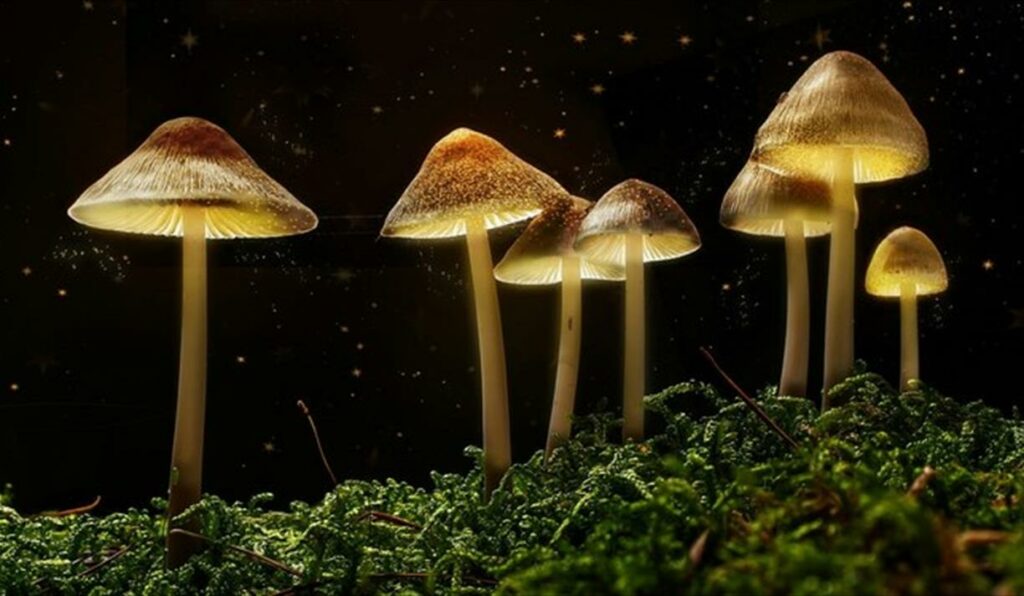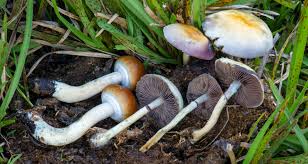Introduction
In recent years, magic mushrooms—long associated with counterculture and recreational use—have reemerged as a promising tool in mental health therapy. Central to this resurgence is psilocybin, the active compound in psychedelic mushrooms, which is gaining serious attention from researchers and clinicians for its potential to treat some of the most persistent mental health conditions: PTSD, depression, and anxiety.
What Is Psilocybin?

Psilocybin is a naturally occurring psychedelic compound found in over 180 species of mushrooms. When ingested, the body converts psilocybin into psilocin, which binds to serotonin receptors in the brain. This interaction often results in altered perception, emotional release, and expanded consciousness—hallmarks of the psychedelic experience.
But beyond the trip lies something deeper. Psilocybin appears to “reset” brain activity, particularly in areas linked to mood, fear, and rumination. This neurological shift can give individuals new perspectives on their trauma, thought patterns, and emotional blocks.
Psilocybin and Depression: A Breakthrough in Mental Health?
Traditional antidepressants often require long-term use and may come with a slew of side effects. Psilocybin, in contrast, has shown promise in delivering rapid and sustained improvements in mood after just one or two guided sessions.
Studies from institutions like Johns Hopkins University and Imperial College London have found that psilocybin-assisted therapy can lead to dramatic reductions in treatment-resistant depression. Participants often report feeling more emotionally open, connected, and able to engage with life after their experiences.
These changes are not simply the result of the drug itself but stem from the powerful insights and emotional shifts psilocybin can unlock—especially when paired with professional therapeutic guidance.
Treating PTSD: Facing Trauma Without Re-Traumatization
PTSD (Post-Traumatic Stress Disorder) is notoriously difficult to treat. Traditional therapies like cognitive behavioral therapy (CBT) and exposure therapy can be effective but may not work for everyone—and sometimes risk retraumatizing patients.
Psilocybin offers a different path. It creates a mental space where individuals can revisit traumatic memories with reduced fear and judgment. Many describe these sessions as profoundly healing, as they’re able to process their experiences from a new, more compassionate perspective.
Early research suggests that psilocybin may decrease the activity of the amygdala (the brain’s fear center) while enhancing connectivity in areas associated with emotional regulation and self-reflection. This neurological shift allows for a safer exploration of painful memories and emotional wounds.
Addressing Anxiety: Easing Existential and Social Fears
Anxiety, whether general or situational, can erode quality of life. Psilocybin has shown particular promise in alleviating existential anxiety—especially in people facing terminal illnesses.
In clinical studies, patients with life-threatening cancer who were treated with psilocybin reported lasting reductions in anxiety, fear of death, and emotional distress. They also experienced increases in life satisfaction, mindfulness, and social connection.
Psilocybin appears to help dissolve the rigid thought loops that feed anxiety, allowing individuals to gain distance from their fears and see their lives from a broader, often more spiritual, perspective.
Why Set and Setting Matter
Psychedelic therapy is not as simple as taking a pill. The “set and setting”—your mindset and environment—play a huge role in shaping the experience. That’s why clinical psilocybin therapy is conducted in controlled environments with trained therapists who guide and support patients throughout the session.
The therapeutic process doesn’t end when the effects wear off. Integration sessions help individuals process what they experienced and apply those insights to their daily lives.
Without this structured support, the experience might be confusing or emotionally overwhelming. With it, psilocybin becomes a powerful catalyst for change.
The Science and Legitimacy Behind the Hype
Psilocybin is no longer just a fringe topic. It has been granted “Breakthrough Therapy” status by the U.S. FDA for treatment-resistant depression, expediting its path to potential approval.
Dozens of clinical trials are underway around the world. Universities, research institutions, and mental health organizations are pouring resources into understanding how psychedelics can revolutionize mental health care.
The emerging consensus: psilocybin isn’t a magic bullet, but it may be a much-needed tool in the therapeutic toolbox—especially for individuals who haven’t found relief through conventional means.
Risks and Precautions
While psilocybin shows immense promise for mental health treatment, it is not a one-size-fits-all solution. The psychedelic experience can be emotionally intense and unpredictable, particularly for individuals who are unprepared or predisposed to mental health vulnerabilities. Some users may experience heightened anxiety, paranoia, or even frightening hallucinations—especially in settings that are chaotic, emotionally charged, or lack proper support. These adverse effects can be overwhelming and, in some cases, potentially traumatic.
Individuals with a personal or family history of psychotic disorders, such as schizophrenia or bipolar disorder, are generally advised against using psilocybin. The compound’s effects on brain chemistry may exacerbate underlying conditions, potentially leading to long-term complications.
This is why medical supervision is not optional—it’s critical. Clinical psychedelic therapy is conducted in highly controlled environments, with careful screening to ensure candidates are mentally and physically prepared. Sessions involve professional preparation, monitored dosing with therapeutic guidance, and post-session integration to help patients process their experience meaningfully. These structured safeguards significantly reduce the risk of adverse effects and enhance the potential for long-term mental health improvements. Without this support system, even a well-intentioned experience can go wrong, underscoring the importance of professional oversight in psychedelic healing.
The Future of Psilocybin Therapy
We are witnessing a paradigm shift in how we view mental health treatment. Psilocybin, once dismissed as a dangerous recreational drug, is now being reevaluated through the lens of neuroscience and compassion. Its potential to heal the emotional root causes of trauma, anxiety, and depression is real—and increasingly supported by science.
As legal frameworks evolve and research continues, psilocybin therapy may soon become a mainstream option for those in need of deep, lasting healing.
Also Read: Microdosing Magic Mushrooms: Hype or Hope for Wellness?
Final Thoughts
Magic mushrooms may seem like an unlikely hero in modern mental health care, but science is validating what indigenous cultures have long known: that these natural substances can offer profound emotional and spiritual healing.
When used responsibly, under medical guidance, and with proper integration, psilocybin has the potential to reshape how we treat some of the most stubborn and painful conditions of the human mind. The future of therapy may very well be growing from the ground beneath our feet.

